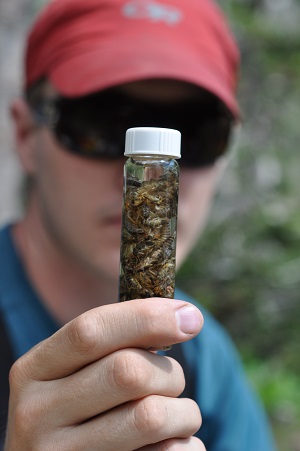Study reveals why tropical mountain streams are species rich
Species living in tropical streams experience small seasonal variations and have become highly adapted to narrow temperature ranges. This creates the perfect condition for new species to evolve, according to a study published in the Proceedings of the National Academy of Science.
 Distinguished Professor LeRoy Poff led the multi-institutional project that provides the mechanisms to help explain global patterns of biodiversity. The study, funded by the US National Science Foundation, gives the strongest evidence to date supporting a longstanding evolutionary hypothesis about why tropical mountains have more species than temperate mountains.
Distinguished Professor LeRoy Poff led the multi-institutional project that provides the mechanisms to help explain global patterns of biodiversity. The study, funded by the US National Science Foundation, gives the strongest evidence to date supporting a longstanding evolutionary hypothesis about why tropical mountains have more species than temperate mountains.
“Tropical mountain streams lack the seasonal temperature variation of their temperate counterparts. This results in stream species becoming highly adapted to stable temperatures,” explains Poff. “Species don't move up and down mountains because they have narrow temperature tolerances. This lack of movement limits interaction with adjacent populations, and thus reduces gene flow. When populations are isolated over long periods of time, genetic changes accumulate in the different populations, leading to the formation of new species.”
Stream species in temperate regions, on the other hand, are exposed to large temperature variations over four seasons. These species have adapted to a broader temperature range, and are able to move up and down mountains and share genes between populations. This has resulted in more homogenous and less diverse populations.
To show the variation in stream species and temperature, researchers collected samples from up to 13 separate streams every 200 metres of elevation change in two mountain ranges: the Rockies in Colorado, and the Ecuadorian Andes. They compared the thermal tolerances of species, the amount of population gene flow, and the rates of evolution in three types of aquatic insects – mayflies (Ephemeroptera), stoneflies (Plecoptera) and caddisflies (Trichoptera).
As predicted, tropical species had narrower thermal breaths than their temperate counterparts. Analysis also showed that elevation and geographic distance have greater effects on genetic differentiation among tropical stream insect populations compared with temperate ones. Genomic results show extensive population structure and reduced dispersal rates in tropical taxa due to higher isolation-by-distance and isolation-by-elevation in tropical mountains.
“A really interesting aspect of the project was our use of ‘DNA fingerprinting’ to discover a lot of hidden diversity in the tropics,” says Poff. “First we collected the insects and classified them based on their visible features. Then we analysed their DNA to discover that what we assumed were the same, were actually a range of genetically distinct species. These ‘cryptic species’ we found in Ecuador more than doubled the known amount of diversity in these insects.”
The study also points to further evidence that tropical species are more susceptible to rapid shifts in climate change.
“Due to low tolerance for temperatures outside their comfort zone tropical species are highly vulnerable to small increases in temperature,” says Poff. “Paradoxically, the same traits that promote high speciation and diversity in the tropics are the ones that render them especially vulnerable to climate change.”
Scientists at the University of Canberra have been awarded funding by the ARC to build on this research. The team, led by Associate Professor Ben Kefford, and including Distinguished Professor LeRoy Poff, Professor Ross Thompson, and colleagues from Griffith University, will study species richness at temperate and tropical locations from Mt Kosciuszko and north Queensland. The team will also extend the study to examine how daily temperature variations impact diversity.
“The Colorado-Ecuador study raised some new questions about how much patterns of diversity might be explained by daily fluctuations in stream temperature, which varies across latitude and elevation. We will be investigating this in our Australia study,” says Poff. “It will be exciting to incorporate the Americas data to work towards a more general global understanding.”
LeRoy Poff is a Distinguished Professor at the Institute for Applied Ecology, University of Canberra; and Professor in the Department of Biology and Director of the Graduate Degree Program in Ecology at Colorado State University, USA.

